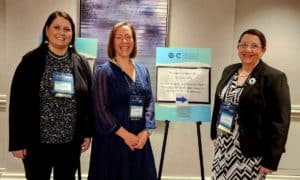Davis & Elkins College Professor of Nursing Dr. Melissa McCoy has a longtime interest in Type 2 diabetes mellitus and she recently presented some of her research findings on the condition at the Council for the Advancement of Nursing Science 2022 State of the Science conference. The three-day session in Washington, D.C., focused on social and structural determinants and how they impact equity in health care and research.
McCoy was part of a four-person panel selected to give a symposium podium presentation titled “Understanding Loneliness as a Health Priority and Health Determinants in Adults with Chronic Illness.” She was joined on the panel by Dr. Laurie A. Theeke, Dr. Jennifer A. Mallow and Dr. Teresa Kelechi.
McCoy’s discussion was titled “The Impact of Social Determinants and Psychosocial Factors on Coping Patterns in People Living with Type 2 Diabetes Mellitus in North Central Appalachia.” Much of McCoy’s research, including that for her Ph.D. dissertation, has focused on Type 2 diabetes mellitus. The condition, also known as adult-onset diabetes, impairs the way the body regulates and uses sugar for fuel. It is more common in Appalachia than in any other region of the United States.
McCoy’s career in nursing and her brother’s diagnosis with Type 2 diabetes mellitus led her to want to learn more about the condition and find a way to help people cope with the changes it brings about.
“As a critical care nurse, I cared for so many patients whose life was normal one minute and very different the next minute,” McCoy said. “Thinking about the different patients led me to think about how different life would be after experiencing a life altering change.”
With that in mind, McCoy developed a concept called Taking on a Life Altering Change.
“This is defined as a rhythmically transcendent journey of experiencing ups and downs on the way to acceptance,” McCoy explained.
In her research, McCoy examined relationships among personal factors, psychosocial factors, and coping patterns in people living with Type 2 diabetes mellitus in north central Appalachia. The study group was made up of 40 men and 40 women, ages 18 to 64, who received chronic management care for Type 2 diabetes mellitus at a small hospital-based rural clinic over a six-month period.
“These participants living with Type 2 diabetes mellitus were found to have mild anxiety, mild depression, moderate diabetes distress and moderate loneliness,” McCoy explained.
Getting treatment for these psychosocial factors, along with establishing positive coping skills, could improve the health outcomes of people with Type 2 diabetes mellitus, the study concludes.
McCoy and a team of nurse researchers, a physician and a biostatistician have applied for an R01 grant that will explore psychological, social, physiological and behavioral factors associated with social connectedness, loneliness and social isolation in adults in Appalachia. If funding is approved, the project will begin in April.
At Davis & Elkins College, McCoy is the director of the Associate Degree Nursing Program and professor of nursing. She holds a Ph.D. in nursing from West Virginia University, a Master of Science in nursing with a specialization in family nurse practitioner from Radford University, and a Bachelor of Science and Associate in Science in nursing, both from Bluefield Sate College.
The Davis & Elkins College Division of Nursing offers an Associate Degree Nursing Program that includes an LPN to ASN option, as well as an accelerated three-year or four-year Bachelor of Science in nursing and an online RN-BSN degree completion program. For additional information, visit www.dewv.edu/academics/nursing/.

Davis & Elkins College Professor of Nursing Dr. Melissa McCoy, left, and panelists Dr. Jennifer A. Mallow and Dr. Laurie A. Theeke gave a symposium podium presentation on “Understanding Loneliness as Health Priority and Health Determinant in Adults with Chronic Illness” at the Council for the Advancement of Nursing Science. Not pictured is panelist Dr. Teresa Kelechi.

